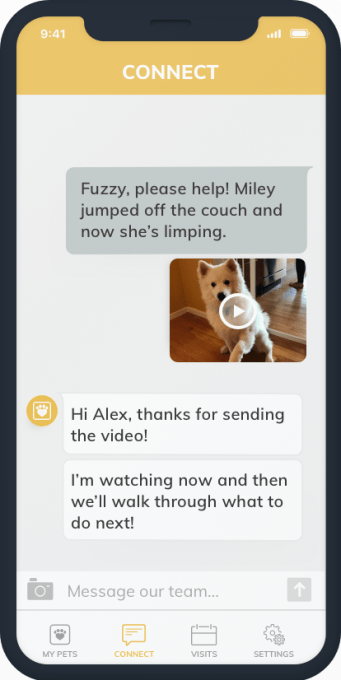A new subscription service will now let you chat with a vet from your smartphone for $10 per month. This telemedicine vet care plan is the latest from Fuzzy Pet Health, a subscription vet care service providing in-home vet visits to subscribers in the greater San Francisco Bay Area. But while in-home pet care may take time to properly scale, on-demand vet Q&A is something that can be offered nationwide.
Fuzzy Pet Health Connect, as the new telemedicine service is called, works over the Fuzzy Pet Health mobile app, allowing customers to send text, pictures and videos to a vet at any time, then receive real-time medical help.

The vets can help with behavioral advice, training tools, new pet questions or other concerns that may have normally required a vet visit to diagnose — like a cat that just vomited, or a dog with runny stool.
As Fuzzy Pet Health co-founder Eric Palm explains, the new service can serve as the initial triage that may actually save pet owners a visit to the vet, at times.
“It turns out that 80 percent of the time when people think there’s an emergency issue, it’s not actually critical,” he says. “We can triage — we can share pictures and videos, and that’s really helpful.”

If the issue requires an in-person visit, the vet will recommend it.
Unfortunately, laws in most states won’t allow for diagnosis and medications to be subscribed over telehealth services when it comes to pets — a bit unusual, given that people now have access to a variety of video chat doctors-on-demand offerings. But Palm says laws are starting to change.
“Each state has its own Veterinary Medical Board, and there are active discussions on most of these boards on how to relax the rules around telemedicine,” Palm notes. “Our lead veterinarian and co-founder [Dr.] Robert Trimble is part of the conversation with the state boards, and how to best shape the laws to enable better care for pets.”

Today, there are only three places in the U.S. that permit this — Washington D.C., Alaska and Connecticut. The U.S.’s neighbor to the north, Canada, also allows vets to diagnose and prescribe digitally.
In the meantime, vet chat is the best most U.S. pet owners can hope for. But at $10 per month, it’s not too expensive to gain access to that additional level of vet care.
“The average pet parent goes to the vet only 1.6 times a year, while our members get in touch with us roughly once a month. We’re excited to expand telemedicine across the country, and provide pet parents the peace of mind and education that come with easy and unlimited access to high quality care,” said Dr. Trimble, in a statement.
Fuzzy Pet Health is one of several startups capitalizing on advances in technology to offer more affordable care to pet owners. A Swedish startup, FirstVet, also announced its funding today to expand its own local operations. There’s also Seattle-based Petriage, U.K.’s PawSquad, as well as providers of telehealth tools to existing vet clinics, like TeleVet, to name a few.
But many vet-on-demand services have already failed.
“We’ve learned a lot from those that have come before us in this space. On-demand vet care is super hard — just like any sort of on-demand business,” says Palm. “The amount of staffing you need to do that is sort of prohibitive from a unit economics or margin standpoint,” he continues. “So our on-demand product is telemedicine. That allows us to be much more efficient with scheduling and staffing.”
Longer term, however, Fuzzy Pet Health plans to scale its house call subscription service, albeit fairly slowly. (Its head of operations, Alex Aguilera, comes from Lyft and Wash.io, and understands market expansions like this.)
“We know if we go to six markets tomorrow, we’ll fail… we have to build demand and awareness ahead of launch, and we have to have on board a veterinarian team to service that market,” adds Palm.
That said, the company is already talking to vets in larger cities like L.A., New York and Chicago to see where it might go next.
To date, Fuzzy Pet Health has raised $4.5 million in funding from Eniac Ventures, Precursor Ventures, Crosscut Ventures, SV Angel Accelerator Ventures and FJ Labs.
from TechCrunch https://ift.tt/2yOCl01
via IFTTT
Comments
Post a Comment